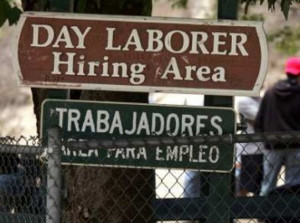Sermon Excerpt
I don’t know about you, but I have never owned a vineyard. Comparatively, I have much more experience with day laborers.
- On a few occasions I have hired a couple of day laborers to assist me with a project.
- For many years I drove by a very large gathering of day laborers every morning on my way to work.
- And, I listened to many of their stories while trying to determine their eligibility for food stamps when I was a caseworker and supervisor for a government agency.
As a caseworker I was required to document a family’s financial situation in great detail. I had to determine exactly how much income they had and from what sources it was derived and then had to explain how that covered their expenses. Often when the income was very low or non-existent yet they told me about paying some money for rent and other basic necessities, I had to ask the origin of that money. The most common answers were from a family member who was helping them out or from odd jobs when work could be found.
While it was difficult for me to budget their likely future income based on their recent sporadic paid work in the recent past, it was far more difficult for those families to manage their finances and to stretch their very limited income to support their families.
Whatever your opinion is about day laborers, I trust that you recognize it is the kind of work that is dependent on the generosity of another. If an employer isn’t inclined to offer you work, then you are left with nothing to do.
This is consistent with one of the more common approaches to the parable. Throughout much of Christian history people have read this parable allegorically.
The vineyard owner is always God.
- With one approach the earliest hired laborers are the faithful Jews and the later hires are Gentiles.
- With another approach, more helpful in our twenty-first century world, the times the workers are welcomed into the work of the kingdom correspond to our stage in life. Some enter in as children, others in young adulthood and still others near the end of life.
With both approaches we are reminded of the same lesson: no matter who you are or when on life’s journey you chose to follow the Way, you are welcome in God’s realm. God shows no partiality. God is exceedingly generous.
While those spiritual meanings may be helpful, the parable ought to speak directly without the need for allegory. What if the landowner is really that – a human vineyard owner? What if the day laborers are really that – people making their living through day laboring?
Within this framework the parable’s emphasis on generosity . . . (read manuscript or watch video)
So What?
We live in one of the wealthiest Empires in human history yet struggle to raise a very low minimum wage that is nowhere near a living wage. As followers of the Way of Jesus we are challenged to be difference makers as we stand for the value of all people, including all workers.
- If you employ people on occasion or on an ongoing basis, how does this parable speak to your role as employer?
- What are you and what is your local congregation doing to work for systemic changes that move toward a living wage for all workers?
